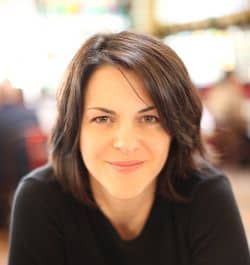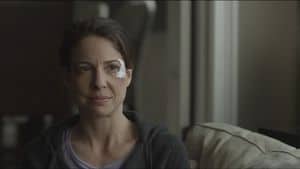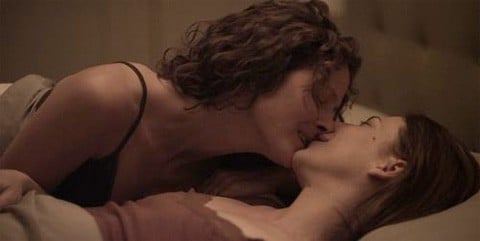Stacie Passon's debut feature Concussion made a big impression at this year's Sundance Film Festival and was snapped up by the Weinstein Company's RADiUS label after just one screening. In the film, Robin Weigert (who you may know for her Emmy-nominated turn as Calamity Jane in HBO's Deadwood) plays Abby, a disillusioned housewife who embarks on a double life in the city as a high-end escort. I spoke with Passon on the phone as her producer Rose Troche — of The L Word — drove her to Williamsburg after a day of interviews in Manhattan. Concussion opens in New York and Los Angeles this Friday.
JC: I wanted to hear in your words how you came to this story and how the project started. What was the genesis for you?
 SP: I just wanted to make a little film in the backyard with my friends. When I showed the script to Rose, she felt that it sort of deserved a little something bigger, so we quickly ramped up the production. Robin [Weigert, who plays Abby, the film's main character] was the first reel that I was just totally blown away with. That was really the genesis of the project: getting Robin and Rose on really took it to a different level.
SP: I just wanted to make a little film in the backyard with my friends. When I showed the script to Rose, she felt that it sort of deserved a little something bigger, so we quickly ramped up the production. Robin [Weigert, who plays Abby, the film's main character] was the first reel that I was just totally blown away with. That was really the genesis of the project: getting Robin and Rose on really took it to a different level.
JC: You didn't think this would be a film that would go into theaters?
SP: Oh no. I live in Montclair, New Jersey and I have a lot of friends who are techies; all we talk about are new digital platforms. I just wanted to make a film that I could monetize–being with a film collaborative was my highest thought. Or maybe I could put it on Vimeo and charge for it.
I knew that the lesbian audience was an underserved audience. I didn't set out to write a lesbian themed movie; it just sort of came in. My intention for it was, let's put on a show. And it was born out of a need to do something creative after a career of serving clients.
JC: Right. You were a commercial director?
SP: Yeah.
JC: As for the story itself–the script and the writing process–is it based on your own experiences? Where did the idea come from?
CONTINUED, AFTER THE JUMP…
SP: When I turned 40, I started re-reading some of the seminal 'women's 101' books–The Second Sex, A Room of One's Own. And these same themes about seeing yourself clearly and giving yourself time and room to grow kept flourishing in these texts. I thought about my own situation, about marriage, about gay marriage. And I thought about the hooker/housewife thing. All these sort of classic themes sort of came together and congealed. And I love the idea of the lesbian hooker. So it really was born out of a lot of different things all happening at the same time. Everything I read complemented it. That's how the writing process took hold, and within six weeks I had a draft. It just kept coming and coming and coming in these really interesting ways.
JC: Why did you choose Rose to reach out to? You'd known each other in Chicago, but hadn't been in close contact when you reached out to her via Facebook.
SP: Rose is the real deal and Rose is perfect for this project. She could take me through the process of making a first film and give me the type of advice you can't pay for, which is: you only have one chance to make a first film–take your time. She was so good at giving notes, particularly when we got into post. She's a genius. And to have that happen was a gift. We took our time with it. She sort of gave me a master class.
JC: She said the same about you!
SP: Well, we have a definite mutual admiration society. How could there not be? I feel the same way about Robin too. She's so smart. I think the success of the film has taken us all by surprise, so we're all about loving each other.
JC: Did you have any trepidation about taking Robin Weigert, who's obviously had such a rich career in TV on the small screen, and putting her on the big screen?
SP: I thought it was an incredible gift. There were varying ideas among us about the type of woman who should play this role. We all came to the conclusion that she be somebody who looked like a normal person. Robin, if she was a man, would be Robin De Niro. She is so dedicated as an actor and she is so good in everything she does. I think she's one of our best. I know I'm biased, but working with her, I know she is.
JC: I know you filmed in your house with your children, and Robin came and lived with your family for a little. Tell me about bringing the film into your real life in that way.
SP: I wanted to create an immersive experience. All of this wonderful lore about the 70s films–character-driven films and the way people used to work together–I wanted to create that same kind of environment. And Robin was down. It just so happened that her apartment wasn't going to be ready for a week or two, so I said, 'why don't you stay?' What she wanted to get was the gist of was how my family operated. What were some of the things that Abby might not appreciate about her family? Why is she so upset; why is she so hardened? One of the notes I would always give Robin–and she would get so mad at me–was, "Don't touch the children so much." And she would say, "You're killing me!" But Abby's so dislocated from her kids–why would she touch them? Until the end of the film, she doesn't touch her kids.
 JC: Let's zoom out and talk a little more big picture. You're married to your wife.
JC: Let's zoom out and talk a little more big picture. You're married to your wife.
SP: Mm-hmm.
JC: In New York, I'm guessing?
SP: Yeah, I live in the suburbs of New Jersey.
JC: New Jersey's big in the news right now–last week, a judge said same-sex couples there have to be allowed to marry. I think there's been a decoupling of 'gay marriage' vs. 'marriage,' and now there's a recognition that this is all just about marriage. No adjective needed. In a similar way, I feel like this film is not a 'gay film,' even though it has a lot of gay elements. And I'm still trying to figure out what I think about that! Do you think 'Concussion' might kind of be on the leading edge of something new?
SP: I think we're past the types of films that are about the right to have our relationships. We're passing that in all sorts of cinema. We used to make up characters to replace ourselves, so a Jewish person couldn't write about being Jewish and they would make Superman. Now we can write about ourselves as ourselves, and other people can look in and see themselves, which is a wonderful way of turning film inside out. So this becomes a movie that's not just about gay people; it's about straight people as well and heteronormative relationships in general.
Many people have asked, will gay people change the face of marriage? I believe they will, because marriage will become better. Marriage will become an institution not of possessions but an institution where people actually want to be together. It does change things up a lot–it gives us more things to chew on. I think that's what you're responding to, because I was responding to that as well. We can say things like, gay people can take their kids for granted, too!
 JC: A lot of people in the film industry would shy away from a film that shows sexuality in this way–not sexual orientation, but actual bodies and the way we enjoy ourselves with others. I think that's very brave! But it's fair to say that Hollywood for the most part is uncomfortable with women's sexuality and it's so striking to see that presented affirmatively. Did you guys think about that as you were making the film?
JC: A lot of people in the film industry would shy away from a film that shows sexuality in this way–not sexual orientation, but actual bodies and the way we enjoy ourselves with others. I think that's very brave! But it's fair to say that Hollywood for the most part is uncomfortable with women's sexuality and it's so striking to see that presented affirmatively. Did you guys think about that as you were making the film?
SP: Yeah! We labored over every point. It was such an awakening to work with Robin and Rose on this. Rose is all about pushing it a little bit–she would always joke that I was clutching my pearls the whole time. And I kind of was! She encouraged me to go a little deeper.
And Robin is so involved in the character that she will only do what the character will do. Watching her somedays, I was stunned. You can't imagine what ended up on that editing room floor. Some of the stuff that Robin did to get into the character was just amazing to watch. Because it was such a low budget shoot, I had to drive her back to her apartment, and I would just be silent in the car. I would just be stunned, quite frankly. It was really amazing to watch her work. I think a lot of that bravery really came out of her. In this case, the best directing was casting.
JC: At the end of the film, we see Abby back in the same place that she was when the film opened, but there's something really different about her because elf the experience she had. It's a very rich takeaway–there's ambiguity and yet it's really positive.
SP: Ann Pellegrini of NYU said, "You can move and still stay in the same place." And the idea that she's on that stationary bike, of moving in the same place–it kind of blew my mind when she said that. I was like, "Yeah, you can!" You don't have to move to the city to be a different person; you can grow where you are. That was profound to me. Because sometimes we feel very lost and imprisoned in our existences, and it's not just the house, or the car, or where we choose to live. It's us, and our worldview, and our outlook, and what we believe. And that needs to be shaken up. And that, I think, is Abby's journey.





